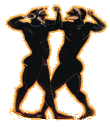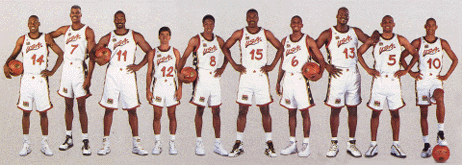 |
|
|
Early Athletes: Amateurs or Pros? One of the things we'll hear argued about the modern Olympic Games is the question of amateurism (and professionalism) of athletes. A professional is paid to be an athlete, and an amateur is not. This was not a concern of the Greeks since ancient athletes regularly received prizes worth substantial amounts of money. In fact, the word athlete is an ancient Greek word that means "one who competes for a prize" and was related to two other Greek words, athlos meaning "contest" and athlon meaning "prize." Our first glimpse of organized Greek athletics is in the 23rd book of Homer's Iliad, where Achilles organizes funeral games for his friend Patroklos who was killed during the Trojan War. In each of the eight events contested on the plain of Troy, material prizes are offered to each competitor, including tripods, cauldrons, valuable metal, oxen, and women. |
|
|
|
[Detail from the Francois Vase, ca. 570 BC] |
 * athletic prizes * bronze tripods However, at the most important athletic festivals (ones
involving all Greek cities or states), the only prizes given
were wreaths of leaves: |
Valuable awards were regularly given as prizes at most of the athletic festival sites all over the Greek world. During the 8th, 7th, and 6th centuries BC, dozens of athletic events were established as parts of religious festivals honoring heroes, gods, or even victorious battles. Athletes who won at any of these Greek games knew they would be very rich when they returned home. According to the Roman author Plutarch, an Olympic victor who was a citizen of Athens could expect to receive in the year 600 BC a cash award of 500 drachmai, which was a fortune. An Isthmian victor would receive 100 drachmai. From writing on a stone done in the 5th century BC, we learn that Athenian Olympic victors received a free meal in the City Hall every day for the rest of their lives, a kind of early pension plan. Later, in the Hellenistic and Roman periods, pensions for athletes became more formalized and could actually be bought and sold. That meant they would be given regular amounts of money for the rest of their lives. This evidence suggests that there were no amateur athletes in ancient Greece, but there were no professional athletes either, for there was no distinction between the two categories, all were simply athletes. The concept of "amateur athletics," developed in the 19th century AD, would have been very strange to the ancient Greeks since the winning of a valuable or important prize was an important part of being an athlete. |
|
* * * TODAY'S OLYMPIC QUESTION * * * "Should professionals be allowed to compete with amateurs at the Olympics? Why or why not?" |
 |
